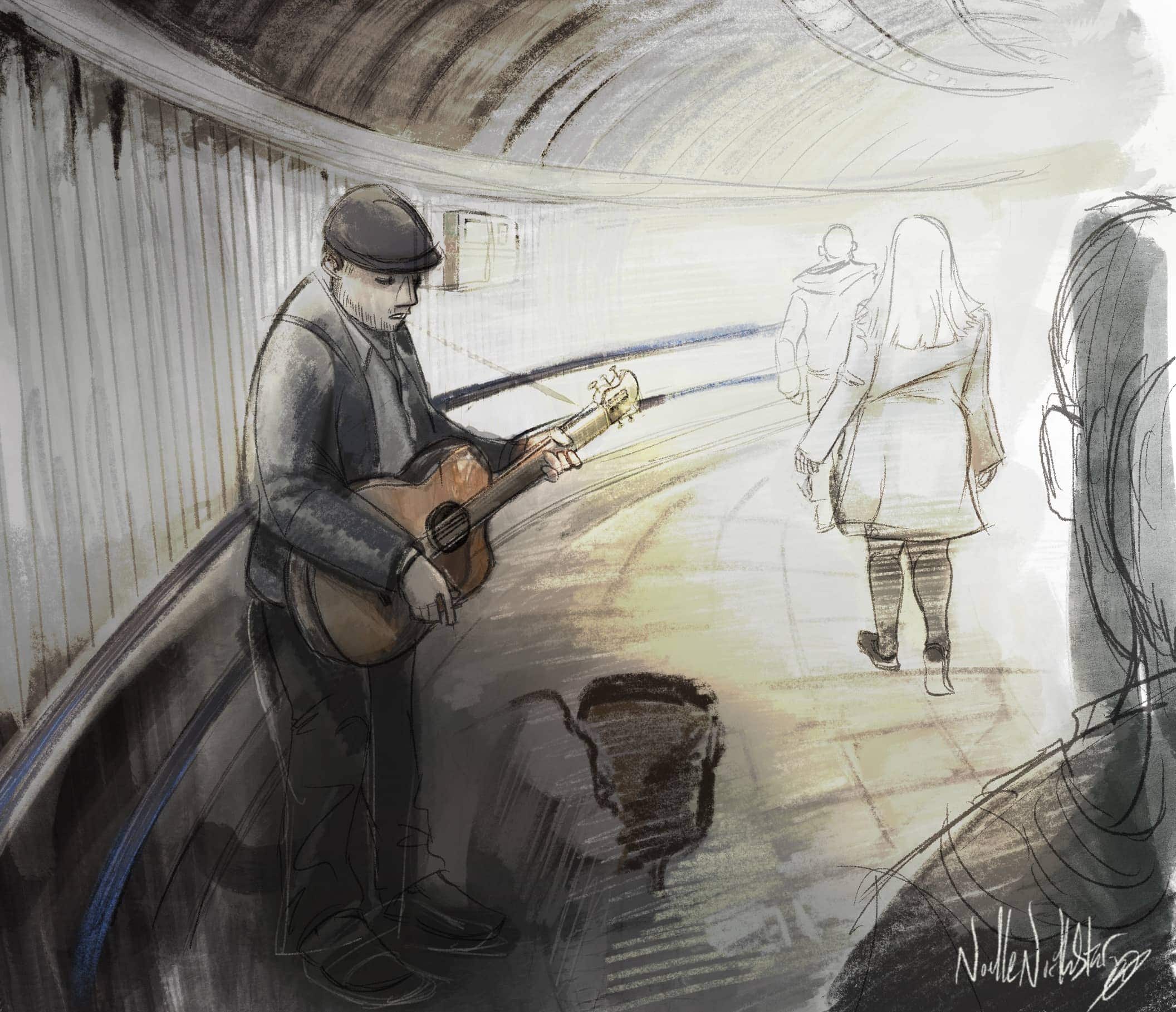

‘Tube Buskers’ by Noelle Northstar
The usually humid tunnels of the tube echoed eerily on Saturday. Outside frosted breath slipped free from the mouths of policemen on duty since the night before. Their heavy leather boots stomped on the concrete and they shuffled in their florescent green overcoats and with hands in their pockets. They eyed the rising sun as it shone down on the River Thames.
It was a winter sun. The bright rays dazzled the officer’s vision but provided no warmth. Below the waters slowly ebbed upwards and downwards, beating on ceaselessly, steadily, certain they would come to their destination. Above the river the chilled air folded over a row of red double decker buses motionless on London Bridge.
Above the river the chilled air folded over a row of red double decker buses motionless on London Bridge
On either side of the Thames the streets were still and the footsteps on the cobbles were silent. A hush crushed the usually active Borough Market. The silence gripped those who passed the bridge and they looked to one another shyly wondering whether their silence said more than a gentle word of reassurance. Again, the city had been stunned and subjected in a moment of the gravest plight.
There is an inexpressible sorrow borne by all when a city grieves. I looked out over the river from the north side as the morning broke. There along London Bridge cars remained jutting out, the banners of tours buses fluttered listlessly the seats empty, and even the birds did not settle on the balustrades. They knew what had happened as did we.
Below, on the underground, where we all get to work, or travel to see friends, there were cancellations, and closures. But most hauntingly of all the buskers’ hands had stilled and their songs were silent. I often listen out for particular buskers at the tubes around London. I came down from the north of the city and came to river without hearing a single note on Saturday. It was as though the air itself were too oppressed to carry music.
On the train three Sheffield Wednesday fans had travelled from Yorkshire to watch their team play Charlton at The Valley, in south London. The ‘Owls’ as the south Yorkshire side are known, won 3-1 and I imagine their vans went home happy. Their travelling to London after Friday was a small act of defiance. In characteristically phlegmatic British style, they had braced themselves for the weather wearing anoraks, scarfs and of course bobble hats sporting their club’s crest.
In characteristically phlegmatic British style, they had braced themselves for the weather
It was this normal and unremarkable moment which stayed with me as I circled the police cordons and watched the bouquets of flowers spread along the riverbank. I read some of the cards and traced the words of the anonymous messages. The sorrow expressed was for those who were unknown. It has been a recent trait in British life that mass public grief must follow a tragedy, and perhaps, for those who participate in the outpouring it is soothing.
However, others seek solace and look for a softer healing. On Tuesday, at Oxford Circus, along the tunnel connecting the Bakerloo Line to the Central Line a busker strummed his guitar to the passing masses. Perhaps some of them had laid wreaths along the banks of the River Thames. Then it had all seemed so urgent and cruel, but days later I doubt they were even thinking about it. However, the busker played in a way which revealed his quiet, stoic love for the city.
Alone, and not being listened to, he stood in an arch of the tunnel with his guitar case open for the few coins which could be spared. It was an old song he played familiar to the generations past. It began like this: ‘We are caught in a trap.’
It is a love song about a woman, and the hurt and pain of holding someone close to your heart knowing in a moment they may no longer be there. And he sang it like a man, who had felt it all before.
And he sang it like a man, who had felt it all before
And still droves of feet passed him by, but one or two stopped and listened. The song built up and up, until it came to line, we all know: ‘We can’t go on together with suspicious minds.’
That lifted the chilled air which had settled in my heart on Saturday and along the streets above the red double decker buses raced ahead.
Disposable Cam is a Scouse journalist. He was on the Bridge.




